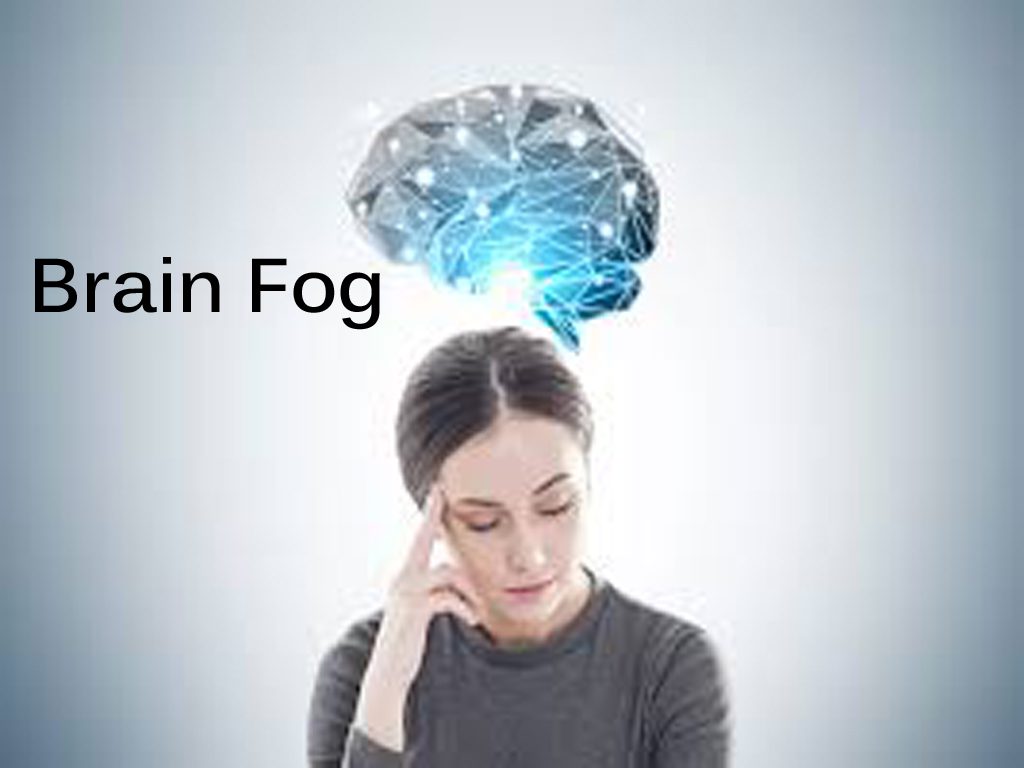Brain fog is a colloquial term used to describe a set of cognitive symptoms that affect your ability to think clearly, focus, and remember things. People experiencing brain fog often feel mentally sluggish, scattered, or fuzzy, which can make it difficult to concentrate, process information, or make decisions.
Common symptoms of brain fog:
- Difficulty concentrating or focusing on tasks
- Memory problems, such as forgetting names, dates, or recent events
- Mental fatigue or feeling mentally exhausted even after rest
- Confusion or feeling “out of it”
- Slower thinking or difficulty processing information quickly
- Lack of mental clarity or a sense of being in a foggy, distant state of mind
- Mood Swings or Irritability-Feeling more emotional, stressed, or irritable than usual due to mental fatigue.
- Difficulty with Organization– Trouble managing tasks, prioritizing, or staying organized. Feeling overwhelmed by responsibilities or forgetting things that need to be done
- Inability to Find Words-Struggling to recall words or stumbling over speech during conversations.
- Reduced Motivation or Interest- A lack of motivation to do tasks, whether personal or professional.
- Trouble Sleeping– Disruptions in sleep patterns, such as insomnia, waking up frequently, or feeling unrested despite adequate sleep.
- Headaches or Light Sensitivity–Some people experience headaches or tension headaches as part of brain fog. Sensitivity to light or sounds can accompany feelings of mental fatigue.
What causes brain fog?
-
Lack of Sleep
- Poor sleep quality or insufficient sleep (typically less than 7–8 hours per night) can lead to cognitive impairment, including difficulty concentrating, memory issues, and mental fatigue.
-
Stress and Anxiety
- Chronic stress or anxiety triggers the release of stress hormones like cortisol, which can interfere with cognitive function and memory.
- Long-term stress can overwhelm the brain, leading to feelings of mental fog.
-
Poor Diet and Nutrition
- Nutrient deficiencies (e.g., vitamin B12, vitamin D, omega-3 fatty acids) can affect brain function.
- Diets high in processed foods, refined sugars, or unhealthy fats can lead to blood sugar imbalances and inflammation, both of which can contribute to brain fog.
- Dehydration can also have a negative impact on mental clarity and focus.
-
Hormonal Imbalances
- Thyroid disorders (hypothyroidism or Hashimoto’s thyroiditis) can lead to brain fog due to low thyroid hormone levels, which are essential for brain function.
- Menopause can cause hormonal fluctuations that affect cognitive abilities.
- Adrenal fatigue (often associated with chronic stress) can lead to feelings of mental exhaustion.
-
Medications
- Some medications, such as antihistamines, antidepressants, anti-anxiety medications, and pain relievers, may cause side effects that impair mental clarity or cause brain fog.
- Long-term use of certain medications (e.g., benzodiazepines) may affect memory and cognitive function.
-
Mental Health Disorders
- Depression and anxiety are closely linked to brain fog. These conditions can lead to cognitive impairments, such as difficulty concentrating, forgetfulness, and mental fatigue.
- ADHD (Attention Deficit Hyperactivity Disorder) can also cause issues with focus and attention, leading to brain fog-like symptoms.
-
Chronic Fatigue Syndrome (CFS)
- CFS is characterized by persistent, unexplained fatigue that doesn’t improve with rest. Brain fog is one of the hallmark symptoms of this condition.
-
Autoimmune Conditions
- Conditions such as multiple sclerosis, lupus, and rheumatoid arthritis can cause brain fog as a result of systemic inflammation or as a side effect of medications used to manage these diseases.
-
Infections
- Post-viral fatigue, such as after a cold, flu, or COVID-19, can lead to lingering cognitive symptoms, often referred to as “COVID brain” or “post-viral brain fog.”
- Infections like mononucleosis and chronic sinus infections can also contribute to mental fatigue and difficulty concentrating.
-
Blood Sugar Imbalances
- Hypoglycemia (low blood sugar) or insulin resistance (often associated with Type 2 diabetes) can affect cognitive function, causing brain fog.
- A poor diet or lack of proper meals can also cause dips in blood sugar, leading to cognitive impairment.
-
Toxic Exposure
- Environmental toxins, such as exposure to mold or heavy metals (e.g., lead or mercury), can lead to cognitive dysfunction, including brain fog.
- Certain chemicals and pollutants in the environment may interfere with neurological health.
-
Gut Health Issues
- Leaky gut, IBS (irritable bowel syndrome), and other digestive disorders are increasingly recognized as contributing to brain fog, likely due to the gut-brain axis, the link between gut health and cognitive function.
- An imbalance in gut bacteria (dysbiosis) or inflammation in the gut may affect the brain.
-
Chronic Inflammation
- Systemic inflammation, which may be caused by obesity, poor diet, or chronic health conditions, can impair brain function and lead to feelings of brain fog.
- Inflammation from autoimmune diseases or infection can also cause cognitive difficulties.
-
Age and Cognitive Decline
- As people age, some degree of cognitive decline is normal, but conditions like Alzheimer’s disease and dementia can cause more significant cognitive impairment, including brain fog.
-
Lifestyle Factors
- Lack of physical exercise: Regular physical activity supports brain health and mental clarity. A sedentary lifestyle can contribute to cognitive sluggishness.
- Poor work-life balance, long hours, and a lack of breaks can contribute to mental fatigue and brain fog.
-
Dehydration
- Even mild dehydration can impair cognitive function, making it harder to focus and think clearly. It’s important to drink enough water throughout the day.
-
Caffeine Overuse
- Too much caffeine can disrupt sleep, increase anxiety, and lead to energy crashes, all of which contribute to brain fog. Reducing caffeine intake may improve mental clarity.
-
Vitamin and Mineral Deficiencies
- Deficiencies in key vitamins and minerals, especially B vitamins, iron, and magnesium, can lead to symptoms of brain fog.
-
Overworking the Brain
- Mental exhaustion from long hours of work, excessive multitasking, or prolonged concentration can lead to temporary brain fog. Taking breaks and practicing mental relaxation techniques can help alleviate this.
How to get rid of brain fog?
1. Improve Sleep Quality
- Aim for 7–9 hours of sleep per night.
- Stick to a consistent sleep schedule.
- Create a relaxing bedtime routine (e.g., limit screen time, avoid caffeine late in the day).
- Ensure your sleep environment is dark, cool, and quiet.
2. Stay Hydrated
- Dehydration can contribute to brain fog, so drink plenty of water throughout the day.
- Limit sugary drinks and caffeine, as they can cause energy crashes.
3. Nutrition
- Eat a balanced diet rich in whole foods: vegetables, fruits, lean proteins, and healthy fats (like those in avocado, nuts, and olive oil).
- Limit processed foods and refined sugars, which can lead to energy crashes.
- Omega-3 fatty acids (found in fatty fish, flaxseeds, and walnuts) are known for supporting brain function.
- Consider adding foods rich in B vitamins (like leafy greens and whole grains) and antioxidants (like berries) to reduce oxidative stress on the brain.
4. Exercise Regularly
- Physical activity improves blood flow to the brain and boosts mood.
- Aim for 30 minutes of moderate exercise most days of the week (walking, swimming, yoga, etc.).
5. Manage Stress
- Chronic stress can worsen brain fog. Try relaxation techniques like deep breathing, meditation, or mindfulness.
- Take breaks throughout the day to reduce mental fatigue.
6. Limit Caffeine
- Excessive caffeine intake can disrupt sleep and contribute to anxiety or jitteriness, making brain fog worse.
- Try reducing caffeine gradually if you’re drinking too much.
7. Get Fresh Air and Sunlight
- Exposure to natural light during the day can help regulate your circadian rhythm and improve alertness.
- A short walk outside can also help clear your mind.
8. Focus on Mental Health
- Anxiety, depression, and other mental health conditions can contribute to brain fog.
- Seek professional help if you think your brain fog may be related to underlying mental health issues.
9. Consider Supplements (with Caution)
- Some supplements may help with mental clarity, such as:
- Vitamin D (especially if you have low levels)
- B vitamins
- Magnesium
- Ginkgo Biloba (often used for cognitive function)
- Always consult a healthcare provider before starting any new supplements.
10. Address Underlying Health Issues
- Brain fog may be a symptom of conditions like hypothyroidism, diabetes, or autoimmune disorders. If it persists, see a healthcare provider for proper diagnosis and treatment.
By implementing a combination of these strategies, many people find significant relief from brain fog. If symptoms continue, it may be worth consulting a healthcare professional to rule out any serious conditions.


Микрозаймы без отказа и долгого ожидания: одобрение за считанные минуты
микрозаем на карту онлайн https://www.dengikg.ru .